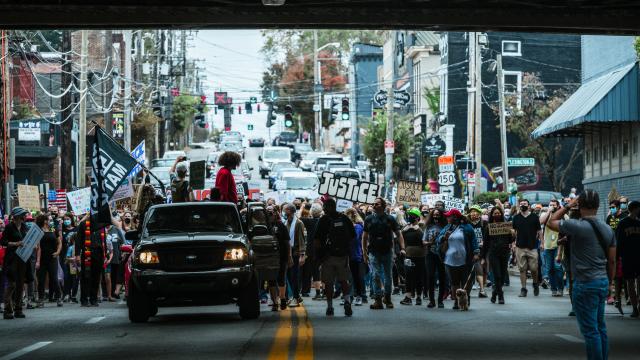A group of Democratic lawmakers on Thursday urged the U.S. government’s privacy and civil liberties watchdog to launch an investigation into claims of government surveillance at protests against police violence and racial inequality spurred this year by the death of George Floyd in Minneapolis police custody.
Citing concerns that U.S. federal agencies may have violated Americans’ rights during attempts to quell nationwide protests, Sen. Ron Wyden, Rep. Anna Eshoo, and Rep. Bobby Rush have called for an investigation by the Privacy and Civil Liberties Oversight Board (PCLOB), an independent panel whose five members hold security clearances and are charged with investigating surveillance abuse.
“Protests have played an essential role in social change movements throughout our country’s history, including the movements for our country’s independence, women’s suffrage, civil rights, and LGBTQ rights. Jacob Blake, George Floyd, and Breonna Taylor are only the most recent cases of Black Americans who have been brutally harmed by law enforcement officials in our country,” a letter to the board says.
The letter outlines recent examples of surveillance, including Customs and Border Protection drones that logged, it says, “270 hours of aerial surveillance footage over 15 cities,” including Minneapolis, New York City, and Detroit. It also cites the FBI’s use of a Cessna 560 aircraft over protests in Washington, D.C., in June, noting the FBI has previously equipped such planes with devices capable of intercepting mobile phone data.
[referenced id=”1520203″ url=”https://gizmodo.com.au/2020/10/u-s-lawmaker-citing-snowden-seeks-probe-into-nsa-targeting-of-congressional-supreme-court-emails/” thumb=”https://gizmodo.com.au/wp-content/uploads/2020/10/16/pun03p99eqsxjfaqt2cp-300×169.jpg” title=”U.S. Lawmaker, Citing Snowden, Seeks Probe Into NSA Targeting of Congressional, Supreme Court Emails” excerpt=”The acting intelligence community inspector general, Thomas Monheim, has been asked to investigate claims that Edward Snowden, while working as a contractor for the National Security Agency, was able to search a classified database for the private emails of a senior member of Congress.”]
It further cites a BuzzFeed news report from June in which the Justice Department is said to have granted the Drug Enforcement Agency authority to “conduct covert surveillance” of protests prompted by Floyd’s death at the hands of police.
Some agencies have denied collecting information on protesters, even if they were asked to do so. The Federal Protective Service, a component of the Department of Homeland Security, for example, asked intelligence analysts at the department to break into phones seized from protesters. A House Intelligence Committee investigation later determined the request was not granted; however, the lawmakers have asked PCLOB to investigate whether the phones were illegally seized regardless.
The Air Force inspector general investigated seven flights over protests this year, the letter notes, but determined no information on U.S. persons was collected. The aircraft, flown by the U.S. National Guard, is equipped with various cameras and sensors capable of capturing protesters’ movements. The inspector general reported the flights “did not collect U.S. person information.”
The U.S. Marshal’s service, likewise, says it did not surveil a Portland protest aboard a single-engine Cessna during a June 13 flight; however, it has admitted to taking photographs of the demonstration in which, it says, protesters cannot be identified.
The lawmakers have asked the privacy board to “investigate and enumerate the legal authorities” under which federal agencies have observed protests and collected information on participants, as well as whether “required processes” have been followed for use of intelligence equipment on U.S. soil.
“Government surveillance has a chilling effect on the constitutionally protected act of peacefully protesting. Downloads for encrypted messaging apps have spiked during recent demonstrations, showing a broad concern about surveillance among protesters,” the letter states.
Representatives Eshoo and Rush are among 35 members of Congress who demanded federal agencies cease surveillance of protests in June. “While the job of law enforcement is to protect Americans, limited actions may be necessary if a demonstration turns violent. However, this authority does not grant the agencies you lead to surveil American citizens or collect vast amounts of personal information,” lawmakers wrote
Sen. Wyden, who hails from Oregon, has previously questioned DHS and the U.S. Marshals Service over reported surveillance in Portland. In a letter to DHS last month, Wyden said reports of “high-tech surveillance technologies” being deployed against protesters have raised “serious concerns” that Congress has a “responsibility to investigate.”
